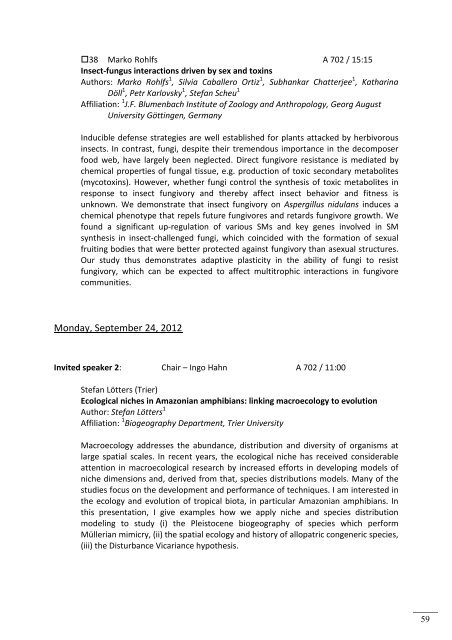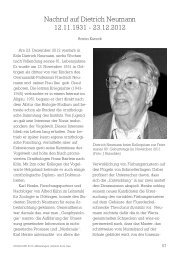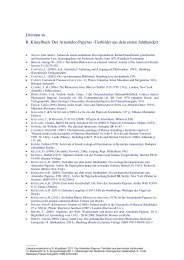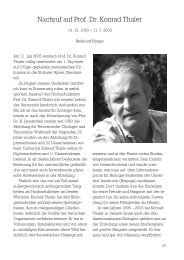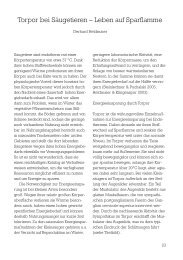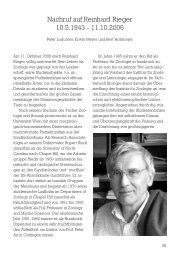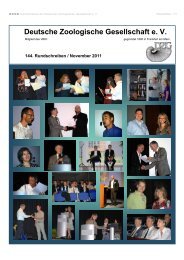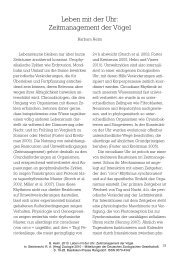- Page 1 and 2:
German Zoological Society 105 th An
- Page 3 and 4:
Dear Friends of the Zoological Scie
- Page 5 and 6:
Saturday, September 22, 2012 Key No
- Page 7 and 8:
Welcome and introductory lecture: K
- Page 9 and 10:
Special Guest Lecture: Chair - Giov
- Page 11 and 12: Special Guest Lecture: Chair - Giov
- Page 13 and 14: Chair - tba �1 Julie Duboscq A 70
- Page 15 and 16: Funding for this project was provid
- Page 17 and 18: Sunday, September 23, 2012 Invited
- Page 19 and 20: �9 Inon Scharf A 704 / 14:30 Char
- Page 21 and 22: arenas to analyze behavioral change
- Page 23 and 24: �16 Ingo Rischawy A 701 / 16:45 A
- Page 25 and 26: 3. Behavioral Biology POSTERS �
- Page 27 and 28: ����5 Nicole Prinz The infl
- Page 29 and 30: motion of their falling prey they l
- Page 31 and 32: esults imply that instead of using
- Page 33 and 34: ����16 Philipp Krupczynski
- Page 35 and 36: swimming with spontaneous rapid tur
- Page 37 and 38: level suggests that some birds of b
- Page 39 and 40: discriminate between different quan
- Page 41 and 42: We hypothesized that supplementary
- Page 43 and 44: summer and are able to attain their
- Page 45 and 46: ����36 Gerhard von der Emde
- Page 47 and 48: 4. Developmental Biology TALKS Satu
- Page 49 and 50: �22 Franziska Anni Franke A 704 /
- Page 51 and 52: (ii) the characterization of candid
- Page 53 and 54: Keywords: Achaearanea tepidariorum,
- Page 55 and 56: Downstream of Kringelchen, three al
- Page 57 and 58: 6. Ecology TALKS Invited speaker 1:
- Page 59 and 60: Chair: Kathrin Lampert �33 Hannah
- Page 61: �36 Michael Heethoff A 702 / 14:4
- Page 65 and 66: Our results revealed that though so
- Page 67 and 68: the choice area more often than wou
- Page 69 and 70: In our study, we aim to contribute
- Page 71 and 72: ����46 Hannes Imhof A new,
- Page 73 and 74: geneflow among populations in the B
- Page 75 and 76: was already detected in 2008). We c
- Page 77 and 78: harshest end of the gradient, and a
- Page 79 and 80: Chair: Sandra Steiger �45 Ilka Ku
- Page 81 and 82: findings. We found no significant e
- Page 83 and 84: cannot bear up under evolutionary a
- Page 85 and 86: showing species-specific sensory tu
- Page 87 and 88: �58 Oscar Brusa M 627/ 14:15 Dive
- Page 89 and 90: possibility of shelf refugia during
- Page 91 and 92: �64 Gonzalo Machado Schiaffino A
- Page 93 and 94: �67 Martin Plath A 703 / 15:00 Gr
- Page 95 and 96: ����62 Lutz Bachmann Mitoge
- Page 97 and 98: eceiving less food per individual i
- Page 99 and 100: substitutions that we observed in a
- Page 101 and 102: ����73 Manuela Ferrari Coop
- Page 103 and 104: ����76 Meike Hiermes The dy
- Page 105 and 106: ����80 Regina Jäckel Metap
- Page 107 and 108: ����83 Ulrich Knief QTL map
- Page 109 and 110: specialization that can be found in
- Page 111 and 112: lineages: euphorbiae, the endemic l
- Page 113 and 114:
along the coast, whereas in Rio Gra
- Page 115 and 116:
trends on the phenotypic level rema
- Page 117 and 118:
continent featured at least one dis
- Page 119 and 120:
acquisition. We collected an outsta
- Page 121 and 122:
y predation risk. However, hunger l
- Page 123 and 124:
information content and function. H
- Page 125 and 126:
Semi- and ultra-thin sections and a
- Page 127 and 128:
lacking circular muscle fibers, eve
- Page 129 and 130:
composition of the secretory duct d
- Page 131 and 132:
�79 Julius Braun A 703 / 15:00 Mo
- Page 133 and 134:
species represent a large magnitude
- Page 135 and 136:
labrum are two different, but close
- Page 137 and 138:
11. Morphology POSTER ����1
- Page 139 and 140:
����115 Christiane Casper T
- Page 141 and 142:
����118 Katja Jaszkowiak Th
- Page 143 and 144:
using immunohistochemistry and conf
- Page 145 and 146:
on their developmental mechanisms,
- Page 147 and 148:
����129 Caren Pawlowski Rec
- Page 149 and 150:
genus on the dorsal aspect of the s
- Page 151 and 152:
machinery contributes to sensitive
- Page 153 and 154:
�90 Carlos Mora-Ferrer A 701 / 14
- Page 155 and 156:
Sunday, September 23, 2012 Chair: J
- Page 157 and 158:
�96 Matthias Wittlinger A 701 / 1
- Page 159 and 160:
ASCE and DSC, send detailed informa
- Page 161 and 162:
moths’ perception of sex-pheromon
- Page 163 and 164:
approach with patch-clamp recording
- Page 165 and 166:
����135 Stefanie Blankenbur
- Page 167 and 168:
����138 Hannah Burger Have
- Page 169 and 170:
(TKRP), myoinhibitory peptide, SIFa
- Page 171 and 172:
����145 Ruth Maren Frings A
- Page 173 and 174:
����148 David Goyer Giant S
- Page 175 and 176:
����151 Jennifer Ignatious
- Page 177 and 178:
����154 Lutz Kettler A doub
- Page 179 and 180:
Software and data is freely availab
- Page 181 and 182:
845 µm and 545 µm (50 Hz) and 255
- Page 183 and 184:
provides the ants with precise info
- Page 185 and 186:
����166 Martin Strauch Imag
- Page 187 and 188:
learning of song. We used short-day
- Page 189 and 190:
����173 Andrea Wirmer Neuro
- Page 191 and 192:
In the current project we are looki
- Page 193 and 194:
absence or presence of 2.000 ng/ml
- Page 195 and 196:
cloned into a RNA producing vector
- Page 197 and 198:
we used feces samples as sources fo
- Page 199 and 200:
�118 Bostjan Vihar M 629 / 15:15
- Page 201 and 202:
superfamily of the ABC transporters
- Page 203 and 204:
influence of 6-MBOA on the reproduc
- Page 205 and 206:
demonstrated that the transfection
- Page 207 and 208:
����183 Ina Hermann The rol
- Page 209 and 210:
����186 Cristina Sánchez G
- Page 211 and 212:
one of these basic problems of CF w
- Page 213 and 214:
number of analyzed genes. To addres
- Page 215 and 216:
from neighbouring South Atlantic de
- Page 217 and 218:
only form a natural group with the
- Page 219 and 220:
Aegean appear distinct from populat
- Page 221 and 222:
����193 Lars Hering Evoluti
- Page 223 and 224:
Phoeniculidae). In general mt genom
- Page 225 and 226:
distinct haplotypes, the morphologi
- Page 227 and 228:
19. Daphnia-Symposium Saturday, Sep
- Page 229 and 230:
often served as a model organism in
- Page 231 and 232:
S�7 Anke Schwarzenberger R513 / 1
- Page 233 and 234:
Furthermore, the sterol composition
- Page 235 and 236:
expectations their parental species
- Page 237 and 238:
����203 Jakub Rusek Access
- Page 239 and 240:
profiles in a clone with strong def
- Page 241 and 242:
(e.g. production of sexual eggs in
- Page 243 and 244:
Population modeling has been used a
- Page 245 and 246:
loci, including chromosomal inversi
- Page 247 and 248:
Key Note: Chair: Axel Meyer R 513 /
- Page 249 and 250:
S�19 Helen Gunter R 513 / 14:30 T
- Page 251 and 252:
S�22 Manfred Schartl R 513 / 16:0
- Page 253 and 254:
microarray based transciptome analy
- Page 255 and 256:
POSTERS dart frogs are ongoing. We
- Page 257 and 258:
21. IMPRS Symposium “Grand challe
- Page 259 and 260:
S�31 Henrik Kusche M 629 / 15:0 M
- Page 261 and 262:
S�35 Martin Bulla M 629 / 16:45 U
- Page 263 and 264:
22. Symposium „Olfaction across s
- Page 265 and 266:
Key Note: Chair: Giovanni Galizia A
- Page 267 and 268:
trail pheromone reception. With the
- Page 269 and 270:
S�42 Matthias Schott M 627 / 12:1
- Page 271 and 272:
inferior chamber of the accessory c
- Page 273 and 274:
Authors Index Author: Page: Abele,
- Page 275 and 276:
Blazek, Stefan 133, 143 Bleckmann,
- Page 277 and 278:
Collatz, Jana 70 Comanns, Philipp 1
- Page 279 and 280:
Finck, Jonas 166 Fink, Christine 19
- Page 281 and 282:
Grandy, Ronald 21 Grap, Nadja 29 Gr
- Page 283 and 284:
Hoffmeister, Thomas 43, 79, 90, 101
- Page 285 and 286:
Kimpel, Dorothea 103 Kindler, Carol
- Page 287 and 288:
Kuzmin, Andrey 235 Laforsch, Christ
- Page 289 and 290:
Matsunami, Hiro 260 Mauz, Lea 70 Ma
- Page 291 and 292:
Oettler, Jan 50, 246 Oexle, Sarah 2
- Page 293 and 294:
Rillich, Jan 31 Rischawy, Ingo 20 R
- Page 295 and 296:
Schopf, Christian 152 Schott, Matth
- Page 297 and 298:
Stey, Kim 214 Stich, Hans-Bernd 230
- Page 299 and 300:
Vences, Miguel 84, 219, 267 Verhuls
- Page 301:
Woodgate, Joseph L. 19 Woopen, Jean


